Personalized Learning Initiative
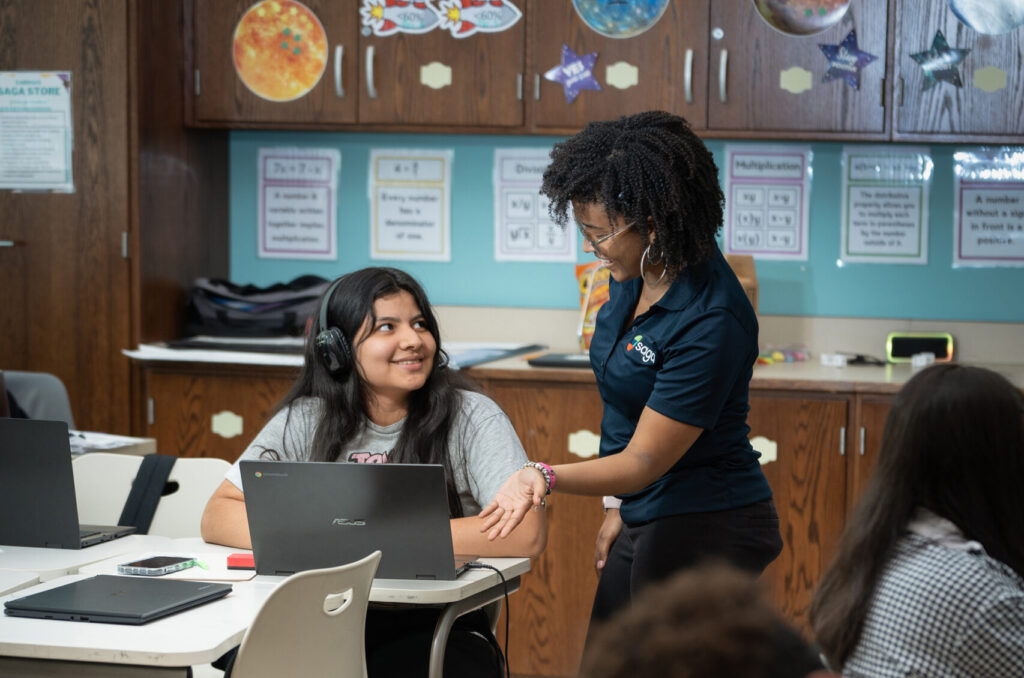
The Personalized Learning Initiative (PLI) is a moonshot to overcome pandemic learning loss and aims to bring high dosage tutoring to students nationwide.
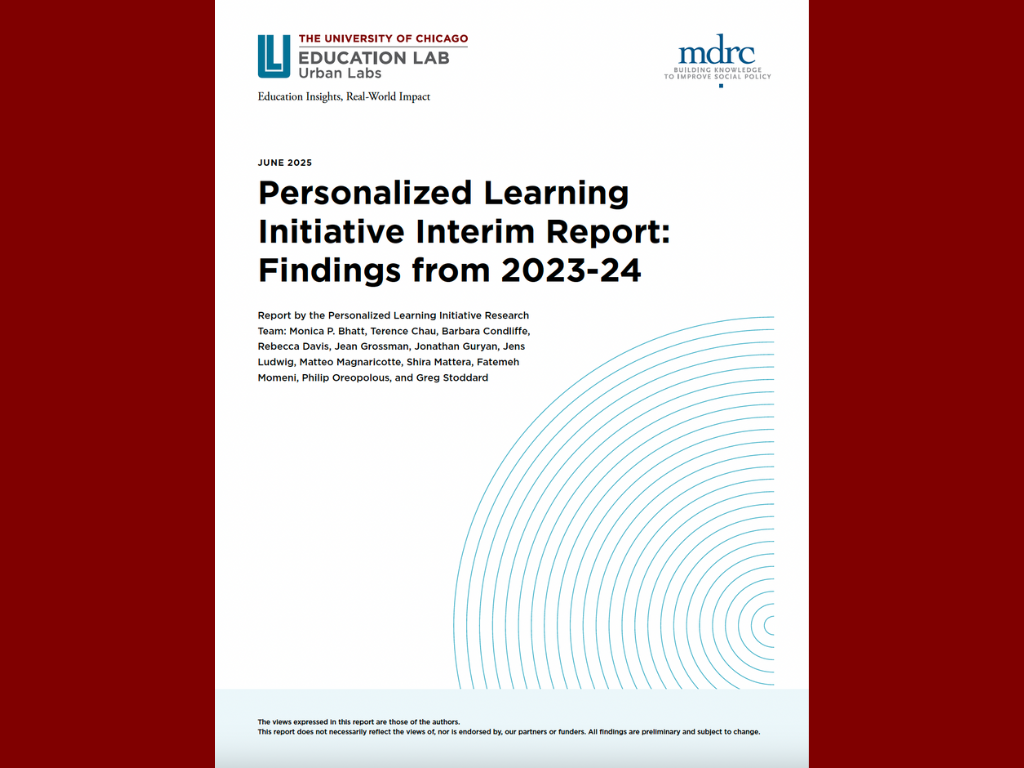
Latest Impact Findings from the Personalized Learning Initiative
RELEASED JUNE 2025: The latest report by the PLI research team shows encouraging results from many types of tutoring–including more and less expensive tutoring models–across the country. These interim findings ought to encourage the field to stay the course in implementing high dosage tutoring and focus on increasing dosage to yield greater learning gains for students.
Project overview
The global pandemic was a once-in-a-century public health crisis, and it triggered an equally unprecedented crisis in public education. The federal government provided emergency funding to support tutoring, and U.S. Secretary of Education Miguel Cardona urged school districts nationwide to adopt tutoring as a one key strategy for addressing pandemic-related learning loss. A strong body of previous research, including past studies by the University of Chicago Education Lab, has shown that tutoring is one of the most cost-effective ways to support student learning.
In 2021, we launched the Personalized Learning Initiative (PLI), a collaboration between the University of Chicago Education Lab, MDRC, and researchers from the University of Toronto and Northwestern University. Our goal is to explore whether and how the benefits of high dosage tutoring can be scaled to reach more students. As districts ramped up their tutoring efforts, we set out to share the best available evidence and to work alongside school systems to generate new, practice-informed insights.
Since then, the PLI has partnered with eight state, district, and charter education agencies nationwide, randomizing more than 27,000 students to date to three different conditions:
- Evidence-based high dosage tutoring (HDT) models;
- New, innovative lower-cost tutoring models that we co-designed with our partner districts, which we called “sustainable” high dosage tutoring models (SHDT); and
- Business as usual.
PLI Site Partners, 2021-2025
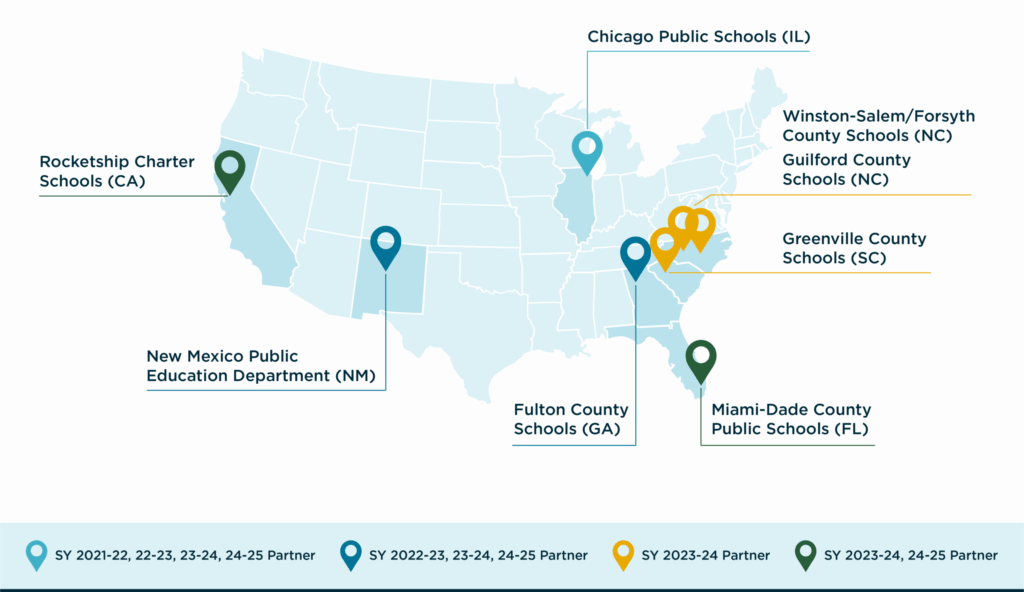
Years Active
2021 – present
Topics
Project Leads
Monica Bhatt
Senior Research Director

Trayvon Braxton
Portfolio Director

Terence Chau
Research Director

Ellen Dunn
Project Director

Jon Guryan
Faculty Co-Director

Jens Ludwig
Faculty Co-Director

Matteo Magnaricotte
Research Director

Fatemeh Momeni
Research Director

Michelle Ochoa
Portfolio Director

Greg Stoddard
Senior Research Director

John Wolf
Associate Director

What is high dosage tutoring?
High dosage tutoring – defined as tutoring embedded during the school schedule that ensures students work consistently on individualized instructional content with their tutor – is among the most effective and cost-effective learning interventions studied to date.
Our research is ongoing — studying tutoring in schools from school years 2021-22 to 2025-26, and analysis of data to continue in the years beyond. We aim to share our findings throughout this process in hopes they can offer timely, actionable insights to policymakers and education leaders.
Our latest impact report focuses on findings to date from the 2023-24 school year, where we worked with eight partner sites to randomize more than 17,000 students (see our previous report, focusing on findings from the 2022-23 school year).

Partner Spotlight
Our MDRC partners published a blog post highlighting key takeaways from the implementation of a tutoring program in Fulton County, Georgia as a part of our Personalized Learning Initiative. The piece offers a deeper look at the strategies that make tutoring successful and how schools can effectively implement them.
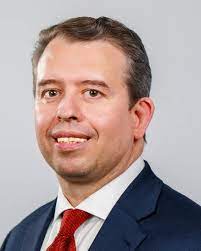
High-dosage tutoring is providing our children the support they need to recover from the learning challenges of the pandemic and reach their full academic potential. We’re proud to be an anchor partner in this project so that we can reach students across Chicago and learn how we can best tailor our supports.
Former CEO of Chicago Public Schools

The Education Lab is one of our nation’s premier educational research organizations, and we are thrilled to have them spearheading this project. Their commitment to rigorous research and proven track record of partnership makes them an excellent choice to support school districts and policymakers seeking strategies that advance student outcomes.
CEO, Accelerate

We need to accelerate learning for the millions of students who have fallen behind during the pandemic. I care deeply about addressing this urgent recovery challenge and helping America’s students realize their true potential. I am thankful so many people are committed to this undertaking, which is important for the future of our country.
Founder and CEO, Citadel
Latest Updates
What America can learn from ‘Toyota Way’ to improve education outcomes
Jens Ludwig and Randall Stephenson present a transformative idea to improve learning outcomes in the U.S.
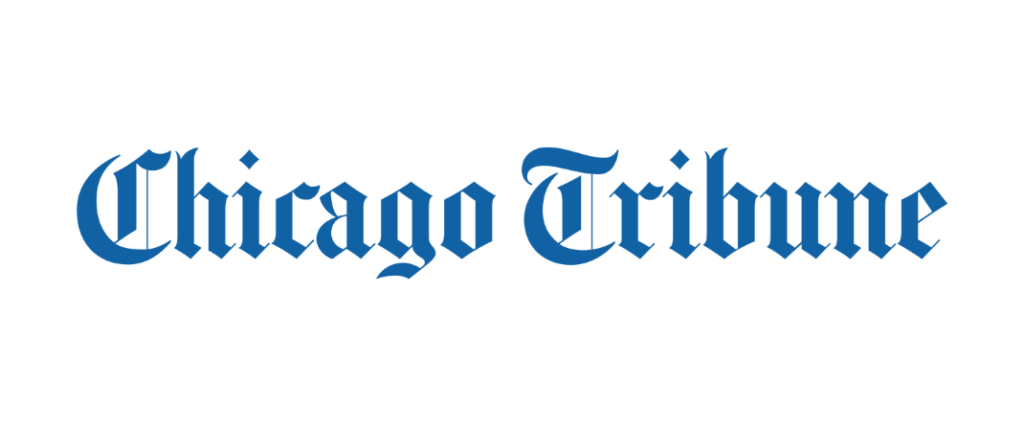
National Study Finds In-School High Dosage Tutoring Is Successfully Accelerating Student Learning, Reversing Pandemic-Era Learning Loss
Initial findings from the Personalized Learning Initiative show that in-school high dosage tutoring meaningfully increased math learning for students in Chicago Public Schools and Fulton County Schools.

How In-School Tutoring Benefits Both Attendance and Math Scores
Education Week’s Olina Banerji talks with Education Lab Senior Research Director Monica Bhatt about preliminary results from the Personalized Learning Initiative, which found that in-school tutoring is leading to positive effects on math scores.

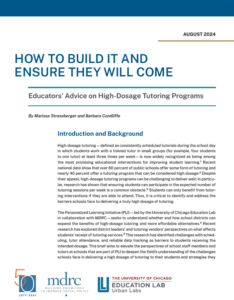
How to Build It and Ensure They Will Come: Educators’ Advice on High-Dosage Tutoring Programs
Read a new brief from our partners at MDRC that highlights educators’ advice on implementing high-dosage tutoring programs.
Realizing the Promise of High Dosage Tutoring at Scale: Preliminary Evidence for the Field
This technical report outlines preliminary results from the Personalized Learning Initiative showing that high dosage tutoring can be scaled and can work–even when delivered in the aftermath of the pandemic and in diverse academic settings.
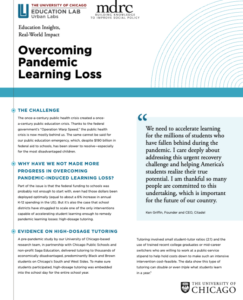
Personalized Learning Initiative Research Brief
Overview of the Personalized Learning Initiative, a nationwide R&D initiative to scale the benefits of tutoring.
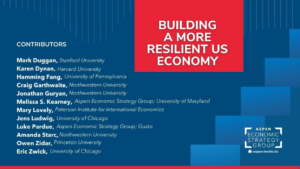
Overcoming Pandemic-Induced Learning Loss
The Education Lab’s faculty co-directors, Dr. Jens Ludwig, professor at the University of Chicago, and Dr. Jon Guryan, professor at Northwestern University, published a paper commissioned by the Aspen Economic Strategy Group for its 2023 policy volume.
